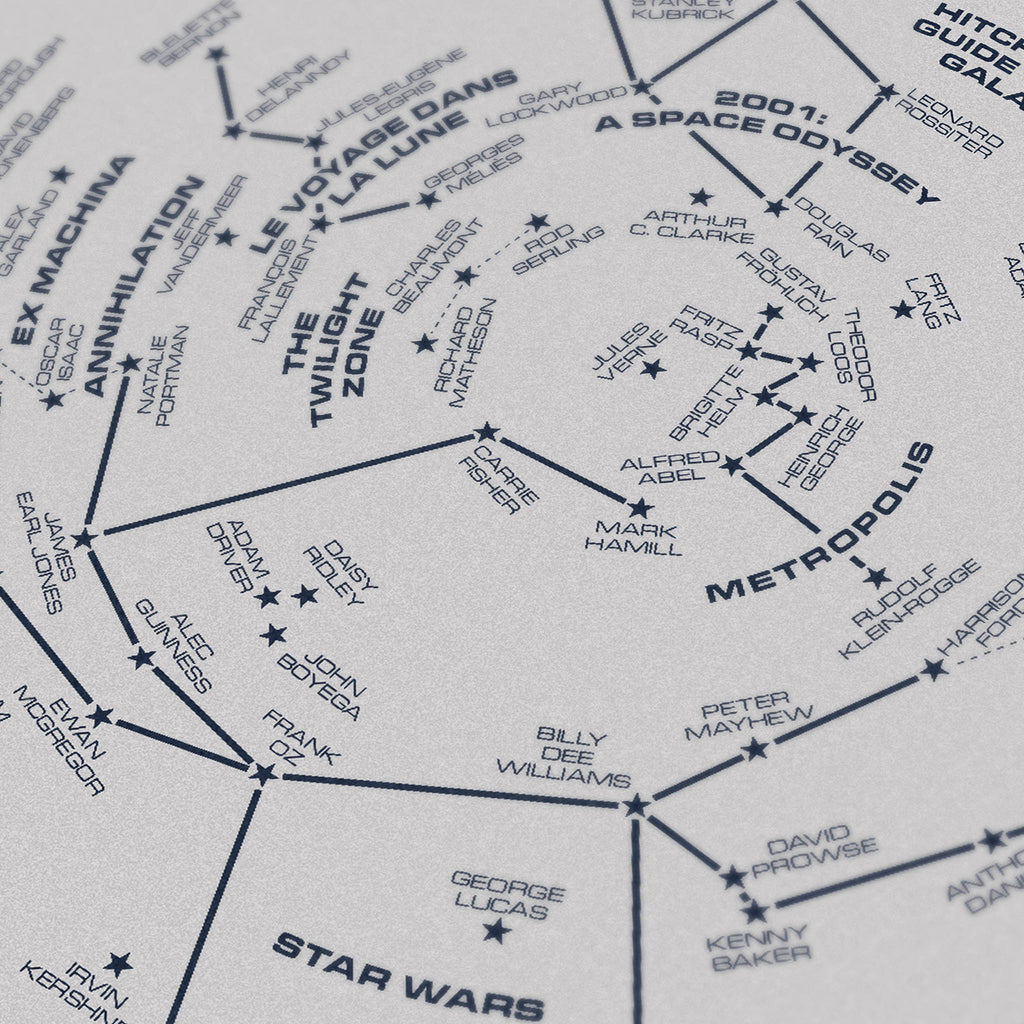"Seeing Stanley Kubrick's 2001: A Space Odyssey (1968) in my teens I realised – probably for the first time – that cinema could be truly profound." Writer and arts professional Mike Pinnington investigates the enduring appeal of Sci-Fi and its relevance to the world we live in.
This article forms part of Dorothy's Studio Stories - originally published on our Boredroom Blog in Autumn 2022.
THE STARS OUR DESTINATION?
SCIENCE FICTION AND WHY IT MATTERS
- Words by Mike Pinnington
I’m about four years old. I’m sat in the dark of a cinema and my baby-sitter is doing those big, can’t quite catch your breath sobs, reserved for when the really bad stuff happens. We can barely stand it as E.T. lies prone, seemingly dying, surrounded by useless, interfering humans. A year later me and dad watch, completely rapt, as Luke and Leia perilously dart through trees on speeder bikes in pursuit of Imperial Stormtroopers on the forest moon of Endor in Return of the Jedi. Two years later still I sit, now aged about seven, in the front row of a cinema with a bunch of friends (and a brave lone parent) watching Back to the Future. It’s the first time I’ll remember ‘experiencing’ a film from start to finish. (I placed no small significance on the fact that the actor playing Marty was, like me, a Michael J.)
These are the first three films I recall seeing at the cinema. They involve, respectively: an alien visitor stranded on earth befriended by a young boy named Elliott; space battles and a force-wielding saviour of the galaxy; a world in which time travel has been achieved by a mad scientist in a DeLorean abetted by a guitar-obsessed smart-ass kid. Very different set-ups, and yet… can it have been coincidence that they each happen to fall into the category clearly marked Science Fiction? Because, for as long as I can remember I’ve loved the genre; one brimming with escapism, spectacle, and wonder tailor made for the big screen. As Bryony Dixon writes in her essay included in the BFI’s Sci-Fi: Days of Fear and Wonder: “[the medium’s] greatest trick is to show us the imaginary.”
Maybe it was a result of growing up during a still simmering cold war (the gravity of which I was still too young to grasp), televised space shuttle launches, and the threat of something called acid rain. Or maybe it was that, as a child of the eighties, I was hooked on Saturday morning kids TV, when advertising really began stoking the fires of movie tie in toy franchises. It was probably a combination of those and other factors, but I couldn’t get enough of it. Attracted to all things Sci-Fi, I sensed relatively early I think, that it wasn’t just about ray guns, flying saucers and shifting product.
Peripherally at least, I knew that some stories had more to say than was reflected by their admittedly seductive shiny surfaces. Chocky, about a young boy with an invisible alien friend, and The Tripods, in which the Earth is subjected to a terrifying alien threat – by contrast to other stuff I was consuming at the time – seemed positively complex. Airing in 1984, they punctuated the releases of Return of the Jedi and Back to the Future (significantly, they were adapted from books by John Windham and John Christopher, authors I would revisit in adolescence and adulthood).
It would become clear to me that Sci-Fi could be, very often is, a genre of ideas. Seeing Stanley Kubrick's 2001: A Space Odyssey (1968) in my teens I realised – probably for the first time – that cinema could be truly profound. Never mind that Douglas Trumbull’s special effects still seemed fresh as wet paint, Kubrick’s vision demonstrated to me that film could also be art. Years later, I saw Andrei Tarkovsky’s Solaris (1972), which had been marketed as a Russian answer to Kubrick’s film. They do have superficial things in common, of course (essentially, hard to comprehend, psychologically crushing occurrences on space missions gone awry); the main factor that unites them, however, is that they transcend mere entertainment or escapism, posing philosophical questions about humanity and our place in the universe.

The genre seems to be peculiarly adept at this. If, as celebrated author Brian Aldiss has written, “Science fiction stories are the fables of a technological age”, they also, through presenting us with what academic, writer and critic Darko Suvin refers to as a “strange newness”, allow us to see things afresh. This estrangement, diverging from the genre’s pulpy reputation, is one of Sci-Fi’s greatest strengths, opening the door to new perspectives on the world we live in, to understand and critique our reality via a futuristic lens. To paraphrase Ursula K. Le Guin: Sci-Fi helps you to recognise what you did not know before.
If films such as 2001: A Space Odyssey and Solaris support the idea that our destinies lie in space, they also carry warnings about our lack of preparedness for what’s ‘out there’, including an inability to come to terms with ‘it’ once we arrive. And yet we are compelled to strike out, to breach the final frontier. As JFK said in his famous "We choose to go to the Moon" speech: “that challenge is one that we are willing to accept, one we are unwilling to postpone.” But some of the biggest challenges will surely come in the form of problems we take with us to the stars. The all too human ones.
From its very early days, Sci-Fi has carried such messages. Georges Méliès 1902 film Le Voyage Dans La Lune (widely considered to be the earliest science fiction film) tantalised audiences with the possibility of venturing out into the great beyond; but its subtext can easily be read as a comment on French colonialism. Duncan Jones’ Moon (2009), meanwhile, is, if anything, more sobering. One of my favourite films of the 21st century so far, although it has a thrilling and touching plot, it is also an indictment of capitalism and mundane McJobs, and calls into question the murky ethics around cloning. (It does, though, unlike 2001’s HAL, have a very friendly AI in Gerty.)
Such ambivalence about what the future holds, suggesting an understandable pessimism and malaise about where we’re at as a race, has frequently been to the fore in more recent Sci-Fi, much of which has featured on TV. The thing is, this nominally bleak position commonly makes for great, immersive stories, largely because we recognise in them our own lives, and the lives of others.
Dystopian nightmare The Handmaid’s Tale, for instance – with its brutal take on the swingeing infringement on women’s and civil rights in general – feels all too urgently relevant. As Margaret Atwood (who would argue for the term speculative fiction as opposed to Sci-Fi), the author of the book from which it has been adapted, has said: “Is it entertainment or dire political prophecy? Can it be both?” In any case, since its arrival on our screens in 2017, The Handmaid’s Tale has so far aired for four seasons with nods and direct references to the show spilling out into wider popular culture and politics.
Somewhat less grim (although it stops far short of utopianism) is the quietly understated Tales From the Loop (2020). With its interconnected, though more or less self-contained episodes responding to the subterranean tech facility of the title, it is heavy with ennui, fetishizing and mourning a future that never came to pass. Abandoned, sometimes obsolete tech – including a ‘transposer’ which allows users to switch bodies; a time-controlling stasis device; and a radio-controlled robot – lies hither and thither, just waiting to be stumbled across. “Careful what you wish for,” Tales From the Loop seems to whisper, warning against nostalgia for the unfulfilled dreams of an easily imaginable alternate reality, one not so very far removed from our own.
Back on the big screen, Sci-Fi is perhaps the dominant force at the box office. There, alongside the questioning and contemplation of films like Under the Skin (2013) and Ex Machina (2014), there remains room for wonder and, indeed, hope. Denis Villeneuve’s 2016 film Arrival, ultimately, is about communication; about listening to and understanding others; about finding ways to talk to aliens rather than waging war against them. And, amid the mind-bending many worlds theory carnage of Daniel Kwan and Daniel Scheinert’s Everything Everywhere All at Once (2022), there lies a simple message. Starring Michelle Yeoh as the perpetually underwhelmed and overworked Evelyn, the film declares that it’s important to own and celebrate our lives – even if we perceive them to be small, mundane, and sometimes disappointing. It is the thoughtful multiverse movie that Marvel could never hope to make.
Like the multi-tasking Evelyn, then, Sci-Fi is very rarely only one thing at a time; it holds up a mirror to our own lives even as it sweeps us to parallel universes and/or distant lands; it entertains while provoking our critical faculties – even if we might not immediately realise it. Not for nothing did Ursula K. Le Guin call the genre “the most flexible, adaptable broad range, imaginative, crazy form that fiction has ever attained.” And that, among many other reasons, is why I keep returning to Sci-Fi, seeking out galaxies far, far away.
MIKE PINNINGTON IS THE CO-FOUNDER AND EDITOR OF THE DOUBLE NEGATIVE
This article forms part of Dorothy's Studio Stories - originally published on our Boredroom Blog in Autumn 2022.
Dorothy’s Film Collection of prints and products are available to buy here.

